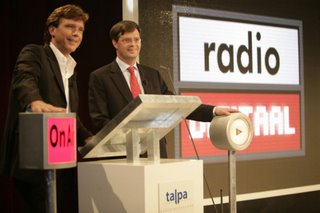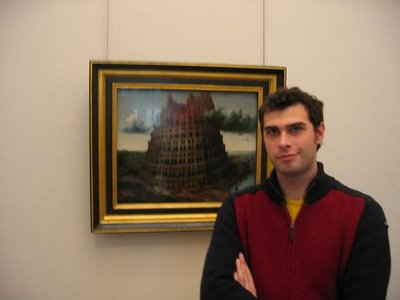Going Dutch
Finally I have an ending in one of the more intricate election results of recent memory: the Dutch parliamentary elections, which were held in late 2006 and only now have resulted in a working administration. While Americans favor the operatic finality of elections like football fans painting themselves red or blue, the Dutch have multiple parties with form into coalitions, some of which have been proved to be more tenuous given the opposition.
Because of the funny alchemy of the system even the party which got the most new seats, the Socialists, doesn't auto-magically get their chief to be the Prime Minister. So the various parties have to cobble together this union, which could possibly be either very much to the left, moderately left, moderately right, or very much to the right. Dutch politics has several prominent paradigms which I cannot fully detail in justice, such as 'pillarization' and the 'poldermodel', but suffice it to say, that consensus amongst groups and polite talk over coffee is a norm within a society for which talk radio and Fox News are an unfathomable political media. All parties can their own equal access to the media. Usually only two parties make a coalition, ever since the reorganization of the Christians into a cohesive party, rarely three. But with more and more parties taking their share of the parliament, bigger coalitions will be needed.

Problems are also personal, as the heads of the two biggest parties, (lets call them the Christian Democrats) CDA and PvdA (they can be the Labor Party) failed at uniting their parties in 2003, even though they admit they aren't so different. The other major possible centre-left coalition member would be the Socialists, who have some pretty major differences of opinion with the party that has the largest number of seats (CDA), as well as Labor. The Socialists have grown the most in influence though, having been seen to have architected the recent rejection of the European Constitution. The Greens (GL) were invited to join, but this was provisionally rejected by them. Also landing in the opposition are the big losers of this cycle, the Neoliberals (VVD), the Neoconservatives (PVV) and the SGP (umm, the Theocons). Plus the D66 ('66 Democrats? I don't know what to call them...) who lead to the breakup of the last cabinet when they dropped out, have been shown the door. Oh, and I don't think the Animal Rights Party (PvdD) will have much sway.

Besides CD and Labor, the big winner is the Christian Union, who rejected a union with the right-wing VVD because of the onerous immigration policies of one of their ministers, Rita Verdonk. They grew from 3 to 6 seats, and espouse a lite social conservatism more concerned with ethics then morality and strongly centre left perspectives on immigration, environmental and economics. Verdonk took a hardline stance on the integration of immigrants into Dutch society. This won her, like the assassinated Pim Fortuyn, no small measure of populist appeal. She marched straight over the line though when she held an extensive public debate over the removal of citizenship from one of her fellow party members, the Somali-born MP Ayaan Hirsi Ali. Ali had had some admitted inaccuracies on some of her immigration forms, but these were subsequently and dramatically reversed. The fact that Verdonk had placed herself in the leadership race for her party, the Neoliberals, had gone unnoticed by no one. She titillated the Dutch polity with quasi-xenophobic comments like the one she made in a Moroccan ghetto: "I do not understand why these Moroccans come to the Netherlands. There is so much work to do here".

Verdonk's overreach though was poorly-viewed, especially by her parliamentary colleagues, because it was against one of her main political rivals and was seen as a perfect storm of opportunism, political payback, grandstanding and nativism by the woman admirers knew as 'Iron Rita'. The Greens desired a vote of no confidence based upon Verdonk's actions and they were joined by coalition member D66. This lead to the fall of the cabinet, which resumed only following this fall's parliamentary elections. Her portfolio (the issues she acts as executive, or minister of) was reduced to running the juvenile corrections systems. As retribution, Labor leader Wouter Bos proposed a general pardon to an estimated 26,000 asylum seekers whose rejections were among Verdonk's proudest examples of her toughening of immigration laws.
Of course, once the parties agreed who was in or out, then they have to figure out how to make their policies and proposals mesh with one another, inspiring another round of debate. Of course what emerges makes no one really happy, but the most people somewhat satisfied. The new Coalition agreed to: continue buying the Joint Strike Fighter aircraft; not offer another referendum on the Euro Constitution; increase education spending; to not privatize the largest airport in the country, Schiphol; increase spending on renewables; tax pollution more; tax air travel more; halt new investments in nuclear; ban burqas in public; and various other minor reforms.
Major complaints included the Socialists lamenting the cancellation of a parliamentary inquiry into the involvement of the Netherlands in the Iraq War; the Greens saying that taxation of pollution should be 15 times as much as proposed; and the Neoliberals and the Neoconservatives criticizing the general pardon for asylum seekers.

As to how long this all lasts, the answer is likely: not too much longer. Provincial elections next month will no doubt add another act to this ongoing drama.
Español | Deutsche | Français | Italiano | Português| Ch| Jp| Ko






